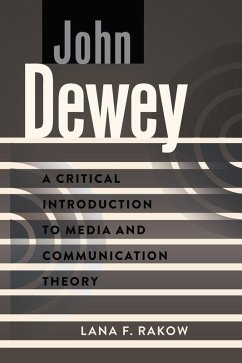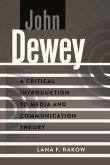John Dewey: A Critical Introduction to Media and Communication Theory reintroduces John Dewey to scholars in communication studies by presenting new material and interpretations from his works, lectures, and correspondence. Dewey has been credited as being one of the giants of American philosophy, a key figure in the development of pragmatism. Going beyond Dewey's reputation in received histories in communication, this book documents his role beginning at the University of Michigan in 1884 until his death in 1952 in establishing a view of communication as the means by which associated life and adaptation to the environment is possible. Communication enables the production of collective knowledge generated through experience and reproduced across time and space, subject to change and correction as those truths are applied and yield consequences. It is also subject to manipulation and misuse. So integral is communication to his philosophy that Dewey is best seen as having a philosophy with communication, not of it. By reviewing Dewey's history of work relevant to communication, technology, and culture, previous assumptions by communication scholars are challenged. A fresh history is presented of his relations to key figures and his significance to the development of speech, rhetoric, journalism, mass communication research, and public relations. Because of his concerns about power, participation, identity, and knowledge, his work remains relevant to contemporary scholars. This book is appropriate for advanced undergraduate and graduate courses in theory, history, and philosophy of communication and is relevant to other disciplines with interests in pragmatism, feminist and race theory, technology, and cultural studies.
"For what purposes is John Dewey's work relevant, a philosopher once asked. Lana F. Rakow offers a comprehensive critical account of the enormous range of Dewey's intellectual agendas and activist leadership. Whether readers have only heard passing references to the (in)famous Dewey-Lippmann debate or already appreciate Dewey's call for public-minded communication processes and systems that support participatory democracy, Rakow clarifies Dewey's approach to communication, leaving no doubt that he deserves a central place in communication studies." -Linda Steiner, University of Maryland









